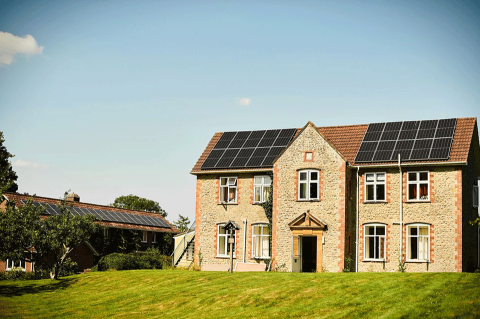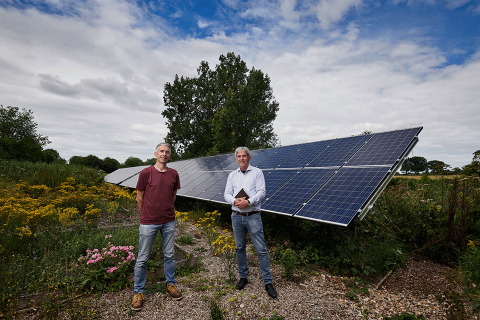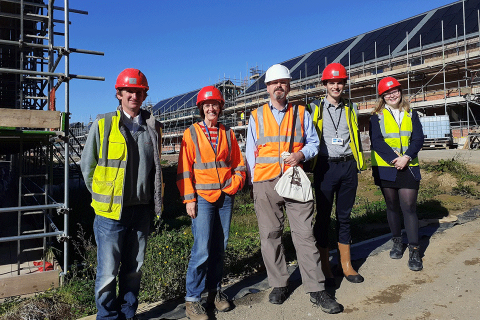Low Carbon Dorset is a programme of activities led by the Dorset Council to help reduce carbon emissions in Dorset.
Low Carbon Dorset is a five-year programme of activities led by the Dorset Council to help reduce carbon emissions in Dorset.
The programme, funded by the European Regional Development Fund (ERDF), focuses on supporting businesses, community groups and public-sector organisations to reduce their carbon footprints through improving energy efficiency, increasing the production of renewable energy, and aiding the development of new low carbon products.
Support is provided to Dorset based organisations through free technical advice, events and workshops, and a £5.6m grant pot.
The challenge:
The Low Carbon Dorset programme responds directly to the national and global need to reduce carbon emissions and encourage clean growth. It has three core aims:
-
To accelerate the deployment of renewable energy and energy efficiency technologies and approaches in Dorset.
-
To stimulate and demonstrate innovation.
-
To support carbon reduction projects across Dorset’s business, community and public sectors.
The programme was designed to tackle the major obstacles and barriers experienced locally in driving the county forward towards net-zero. These challenges were identified as being:
- A lack of understanding of what renewable and energy efficiency opportunities are available for organisations in Dorset, coupled with a lack of technical understanding to allow organisations to benefit from these opportunities.
- Low-carbon projects involve non-standard technologies and approaches requiring ‘at-risk’ investment from organisations.
- Longer than acceptable paybacks on non-standard low carbon measures for usual investment decisions.
- Perceived risks associated with developing low carbon projects and products (including uncertainty over the commercial and business benefits of some low carbon solutions).
The solution:
The Low Carbon Dorset programme was designed to tackle some of these barriers and help boost Dorset’s low-carbon economy and reduce its carbon footprint. These issues are being addressed through the provision of the following support to the county’s business, community and public sectors:
- Free expert advice to help businesses, community groups, and public-sector organisations understand what renewable energy and energy efficiency opportunities are available to their organisation
- Free ongoing technical support to help organisations develop their low-carbon project (including support in building a business case for investment and exploring feasibilities of technologies).
Grant funding to de-risk investment in low-carbon technologies and decrease the payback period to align with organisational investment decisions.
- Grants of up to 40% of project costs have been available to help get projects off the ground.
- Specific grant support for costs incurred in the development of new technologies and approaches to overcome financial risks and lack of capacity.
- Active promotion and showcasing of best practices to encourage replication of low carbon projects within Dorset.
The impact:
Since its launch in April 2018, Low Carbon Dorset has received over 645 applications for support. And, at the time of writing (Apr 22), has awarded over £5.3M in grants to support 170 renewable energy or energy efficiency projects across Dorset Council and Bournemouth, Christchurch and Poole Council areas.
Combined, these projects have already saved around 8,000 tonnes of CO2e and are expected to increase the installed renewable energy capacity in the county by over 11 MW.
How is the new approach being sustained?
By supporting the delivery of low-carbon projects in the business, community and public sectors in Dorset, Low Carbon Dorset is helping on-the-ground change, which will be long-lived. Carbon savings achieved by supported projects will continue to grow year on year, and energy savings are helping provide financial security to the organisations involved long past the lifespan of the current programme.
By actively promoting beneficiaries and their projects, Low Carbon Dorset shares best practices amongst its target sectors and encourages replication across the county and further afield. And online resources developed by the programme, such as guidance documents and case studies, will continue to be available to organisations long past their current lifetime.
Lessons learned:
The high level of interest from Dorset based SMEs and community/voluntary groups in this support shows a real appetite amongst these sectors to reduce energy use and the associated costs.
In 2021, an interim evaluation of the programme and its impact was carried out by external independent evaluators Ash Futures. Overall, the evaluators found that Low Carbon Dorset has made significant progress towards its core objective. Demand for programme support has built over time, with a strong pipeline of interested organisations in place moving forward.
There has been high demand from businesses and community organisations, and the financial support provided through the programme – normally 40% of total project costs – has been enough to incentivise organisations to invest their own funds to take their projects forward.
Feedback, from both beneficiaries and wider stakeholders, has been positive about the support provided by the Low Carbon Dorset team and showed that the ‘additionality’ of the programme has been high.
Direct consultations with many beneficiaries have shown that the programme is affecting positive on-the-ground change. Most organisations have reported reduced energy costs and carbon footprints. Several organisations also cited the importance of using their low carbon credentials to heighten the awareness of others, particularly for those organisations that worked directly in the community.
From a local, national and international perspective the relevance of the activities supported through Low Carbon Dorset remains and, in the view of the evaluators, has been significantly strengthened during the lifetime of the project. The declaration of climate emergencies in both local authority areas – accompanied by the development of climate emergency strategies – has added weight to the rationale and justification for the programme.
During the lifetime of the programme, the UK Government has strengthened its commitment to moving toward its net zero carbon ambitions. To achieve this, significant structural change will be required, including transformational projects. Low Carbon Dorset more closely aligns with local action on the ground, making a small, but important, contribution to local and national ambitions.
Links to relevant documents:
Low Carbon Dorset - Website: https://www.lowcarbondorset.org.uk/
Low Carbon Dorset - Case Studies: http://www.lowcarbondorset.org.uk/case-studies/
Low Carbon Dorset - Organisation Guide to Reducing Emissions: https://www.lowcarbondorset.org.uk/guide-to-reducing-emissions/



